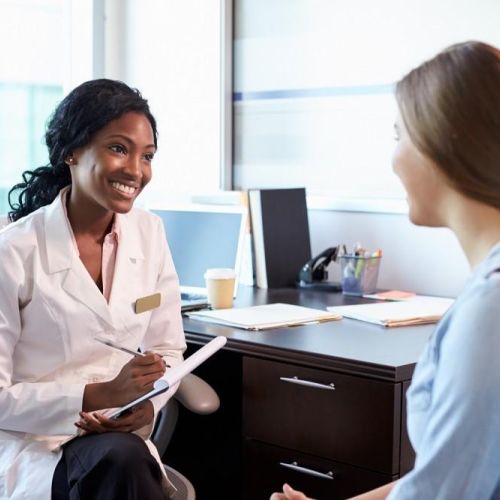How to Qualify for Egg Donation

There are many couples who are unable to conceive and for some of them, donated eggs may be the answer they’re looking for to make a successful pregnancy possible. The team at the Center for Reproductive Health work with infertile couples every day who may not be able to have a baby without the generosity of egg donors. If you’re interested in helping an infertile couple have a family by donating your eggs, you may be wondering what’s involved and how to qualify for egg donation.
Health Requirements
The first step in the egg donation process is to fill out an application. If you meet the eligibility requirements, an in-person interview is scheduled. To donate eggs, you need to be in good mental and physical health and between the ages of 20 and 31. You should have a healthy BMI and not be overweight or underweight and you should have both ovaries and regular periods. You must be a nonsmoker with no history of drug use or alcoholism.
Screening for egg donation is very thorough. You’re given a physical exam which includes evaluating the health of your ovaries. It also includes tests for sexually transmitted diseases and free fertility diagnostic testing including a genetic carrier screening test. This comprehensive screening is a great opportunity for you to learn important information about yourself. Your family medical history is discussed, which should be free of hereditary diseases.
Learning What’s Required
If your physical exam and family health history all go well, you’ll have a meeting with a psychologist for a psychological screening. You’ll learn more about what’s involved in egg donation so that you’re prepared for the time commitment involved and potential complications. Most egg donors have few side effects, but you should be aware that you may experience mood swings, bloating, nausea or diarrhea.
Egg donation doesn’t have any impact on the eggs you have available for future cycles. Some women are afraid that donating eggs could lead to early menopause, but there’s no evidence to suggest that this could happen.
Legal Contract
If you successfully pass all the screenings, before moving forward with the process of egg donation, you’re required to sign a legal contract. This is an agreement between you and the recipient or between you and the Center for Reproductive Health which outlines your rights, duties and compensation as an egg donor.
Throughout the process, your privacy is protected. Egg donation is anonymous and the couple receiving your donation learns only general information about you such as your height, weight and ethnicity.
Donating eggs is a very generous gift to infertile couples, and in return you receive a generous compensation for your time and dedication. Compensation is usually between $5,000 and $10,000 a cycle. If you’re interested in applying to be an egg donor or if you have additional questions, don’t hesitate to contact the team at the Center for Reproductive Health.
Eliran Mor, MD
Reproductive Endocrinologist located in Encino, Santa Monica, Valencia & West Hollywood, CA
FAQ
What does a reproductive endocrinologist and infertility specialist do?
Reproductive endocrinology and Infertility is a sub-specialty of Obstetrics and Gynecology. In addition to managing medical and surgical treatment of disorders of the female reproductive tract, reproductive endocrinologist and infertility (REI) specialists undergo additional years of training to provide fertility treatments using assisted reproductive technology (ART) such as in vitro fertilization.
Reproductive endocrinologists receive board certification by the American Board of Obstetrics and Gynecology in both Obstetrics and Gynecology and Reproductive Endocrinology and Infertility.
When should I see an REI specialist?
In general, patients should consider consulting with an REI specialist after one year of trying unsuccessfully to achieve pregnancy. The chance of conceiving every month is around 20%, therefore after a full year of trying approximately 15% of couples will still not have achieved a pregnancy.
However, if a woman is over the age of 35 it would be reasonable to see a fertility specialist earlier, typically after 6 months of trying.
Other candidates to seek earlier treatment are women who have irregular menses, endometriosis, fibroids, polycystic ovary syndrome (PCOS), women who have had 2 or more miscarriages, or problems with the fallopian tubes (prior ectopic pregnancy).
What are the reasons we are having trouble conceiving?
Approximately 1/3 of the time cause for infertility is a female factor, 1/3 of the time a male factor, and the remaining 1/3 a couples’ factor.
At CCRH, we emphasize the importance of establishing a correct diagnosis. Both partners undergo a comprehensive evaluation including a medical history and physical exam.
Furthremore, the woman’s ovarian reserve is assessed with a pelvic ultrasound and a hormonal profile. A hysterosalpingogram (HSG) will confirm fallopian tube patency and the uterine cavity is free of intracavitary lesions. A semen analysis is also obtained to evaluate for concentration, motility, and morphology of the sperm.
Additional work up is then individualized to direct the best possible treatment option for each couple.
What is IVF? What is the process like?
In vitro fertilization (IVF) is the process that involves fertilization of an egg outside of a woman’s body.
The process starts with fertility drugs prescribed to help stimulate egg development. In your natural cycle, your body is only able to grow one dominant egg, but with stimulation medication we can recruit multiple eggs to continue to grow. After about 8-10 days of stimulation, the eggs are surgically retrieved and then fertilized with sperm in a specialized laboratory. Fertilized eggs are then cultured under a strictly controlled environment within specialized incubators in the IVF laboratory for 3-5 days while they develop as embryos. Finally, embryos (or an embryo) are transferred into the uterine cavity for implantation.
Should I have IVF?
Before deciding if IVF is the right choice, it’s important to sit down with an REI specialist to discuss available treatment options. For some people, other methods such as fertility drugs, intrauterine insemination (IUI) may be the best first choice treatment. At CCRH, we believe each individual couple is unique and not everyone needs IVF.
Is the IVF procedure painful?
While not painful, the fertility medications may some side effects including headaches, hot flashes, mood swings, and bloating. The injection sites may also bruise.
Will IVF guarantee a baby?
Unfortunately, no. Many people think once they start IVF it’s a matter of time that they will be pregnant and have a baby. But according to national statistics per the Society of Assisted Reproduction (SART), on average 40% of assisted reproduction cycles achieve live births in women under age 35. The chances of success then continue to decrease with advancing age.
At CCRH, we employ only evidence-based interventions to ensure patient safety and optimal outcome. While we cannot guarantee a baby, we guarantee that you will receive the best, most advanced, personalized care to help you maximize your chance of a baby.
What is the success rate for IVF?
The average IVF success rate (success measured in live birth rate) using one’s own eggs begins to drop around age 35 and then rapidly after age 40. This is due to the decline in egg quantity and egg quality as a woman ages.
Our clinic’s success rate consistently beats the national average year after year.
Do insurance plans cover infertility treatment? How much does IVF cost?
Individual insurance plans often do not have any coverage for infertility treatments. If you have a group plan, you can call members services to see if they have coverage for infertility (including consultation/workup and IVF).
After your consultation with our REI specialist, one of our dedicated account managers with sit with you to go over the cost of treatment.




